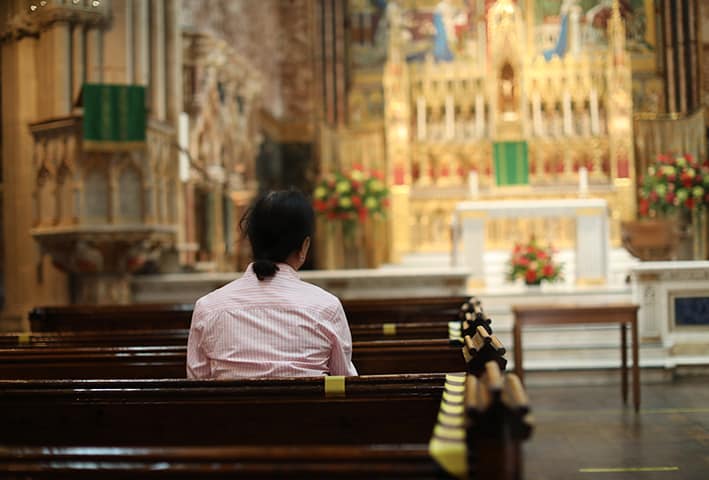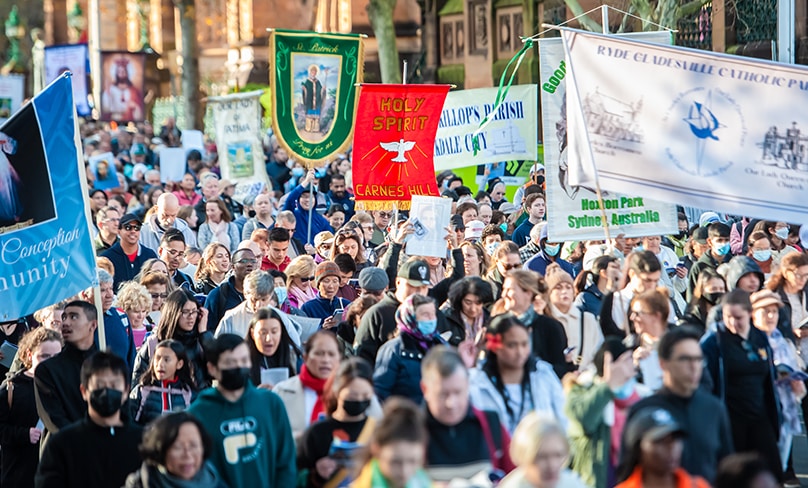
In coming days, the fifth Plenary Council of Australia will commence its second assembly here in the Archdiocese of Sydney. It is the concluding chapter of the first Plenary Council in over eighty years.
It will see 300 or so delegates and advisors gather at the site of Australia’s first cathedral for prayer, discussion and decision at a critical time in the history of our Church.
The Plenary Council convenes in the midst of a gradual decline in both Catholic affiliation and participation in Australia, with a need for the (re)evangelisation of our own people and evangelical outreach to others.
Pressing on the Church too is a decades-long drift from sacramental life, including a present crisis in matrimony, vocations to the priesthood and religious life.
Following decades of scandal, trust remains low within and beyond the Church. The gifts of many laity, including women and lay men, remain untapped.
“Whether one thinks the Church in Australia is in unredeemable crisis, has not one thing to change or lies somewhere in between, it is ultimately the culture of the Church that will determine if this Council bears lasting fruit for Catholic life …”
Emerging social trends and assaults on religious freedom in states and territories must be confronted and call for prophetic leadership, lest future generations think our own were simply blind or indifferent to the challenges at our door.
Whether such leadership and clarity emerge from the Council and in its implementation over the years to come is yet to be seen.
As reported in The Catholic Weekly, some have approached this week’s Council in almost apocalyptic terms, as the apparent “last straw” for the Church in Australia upon which all the frustrated desires of past decades might be lumped.
Others are more modest in their expectations and appraisal of the Council’s worth, recognising it as one step in an ongoing story of Catholic life in this country and certainly not the last word for emerging leaders and spiritually hungry generations to come.

Still others have been bystanders on the road to the Council assemblies, content to watch (or not) the process unfold without contribution, even as the communities to which they belong age and diminish in firm faith and apostolic creativity.
So, there are different starting points and foci among the hundreds of members of the Council, their advisors and the commentators that hang about its edge.
Perhaps this mixed picture is quite ‘catholic’ in that respect, but amid the sheer diversity of approaches and expectations around this Council surfaces an important consideration.
Whether one thinks the Church in Australia is in unredeemable crisis, has not one thing to change or lies somewhere in between, it is ultimately the culture of the Church that will determine if this Council bears lasting fruit for Catholic life and the spiritual and material needs of Australian society. As the saying goes, culture eats strategy for breakfast. It also eats papal encyclicals, policies, and Plenary Councils.
It is the culture of the Church – its constellation of relationships, universe of ideas and material reality – that contributed to the tragic incidents of sexual abuse in the Church in Australia, and it is also the soil in which immense good and grace has flourished over the past century and a half of our history, to the benefit of generation upon generation of the faithful and the broader constitution of Australian life.
“When the Lord gave us the great commission to ‘go and make disciples of all nations’ (Mt 28:19), he called us to an active, intentional and personal discipleship.”
The key task for members of the Plenary Council will be to anchor or ground the various motions, amendments and proposals of the Council in that living foundation of the Church’s culture and promise.
When the Lord gave us the great commission to “go and make disciples of all nations” (Mt 28:19), he called us to an active, intentional and personal discipleship. The Church serves this calling as the sacrament and apostolate of Christ in history.
This deeper grounding of the various Plenary Council motions in, and their evaluation of their utility by, an aspiration to Catholic holiness and mission in Australia, is critical.
Culture is not the starting point for renewal but the end-product of individuals living out holiness, community and mission, and this begins with discipleship – people making a personal, conscious decision to follow Jesus with their whole lives, in and through His Church.

If we want to see new life, apostolic zeal and creative fidelity in the Church I believe we have to start with forming disciples, and that project has much to do with helping individuals to discover a living and personal faith in the midst of the Church.
We know that this commission given to us by Christ is critical to the future mission of parishes, schools, agencies and the myriad other organisations of the Church, to the works of charity and social programs if they are to be fruitful and enduring, to Catholic schools if they are to serve more than utilitarian ends.
So whether it is the proposal of this Plenary Council for a national forum on Catholic education, enhanced catechesis on the sacraments, widespread formation on the disposition of synodality, or various roundtables, pastoral councils or working groups that have been raised for deliberation – it can be said that none of these will bear fruit without deeper roots in discipleship.
We need Christians who have encountered Jesus personally in the midst of the Church, who have surrendered their life to his way, and have made the decision to live by his teaching in all aspects of their life. In short, the Church in Australia cannot afford to pursue reform without conversion.
Pope Francis has underlined this principle throughout his papacy, with relevance to members of our own Council if they are not to deal with mere symptoms.
“As we enter the week’s deliberations, we must avoid the temptation of treating the Plenary Council as an exercise in ecclesiastical political science, the Church as an empty vessel into which we pour our preferences, or the vitality of its mission for future generations as a matter of tinkering with what we have received.”
“There are ecclesial structures which can hamper efforts at evangelisation, yet even good structures are only helpful when there is a life constantly driving, sustaining and assessing them,” Pope Francis wrote in Evangelii Gaudium (26).
“Without new life and an authentic evangelical spirit, without the Church’s ‘fidelity to her own calling’, any new structure will soon prove ineffective.”
As we enter the week’s deliberations, we must avoid the temptation of treating the Plenary Council as an exercise in ecclesiastical political science, the Church as an empty vessel into which we pour our preferences, or the vitality of its mission for future generations as a matter of tinkering with what we have received.
I pray that every member of the Plenary Council will be guided and graced by the Spirit of Christ to see the crying need for spiritual renewal at the heart of our difficulties and promise as a Church.
I pray that each recognises the deep and urgent need to raise up disciples in Australia by all that we do and propose. In this way the Gospel and the Church that I very much love, a Church that has given me a new life, might be a real sign and presence of the unfailing love and mission of Christ for many generations to come.
Related Articles
